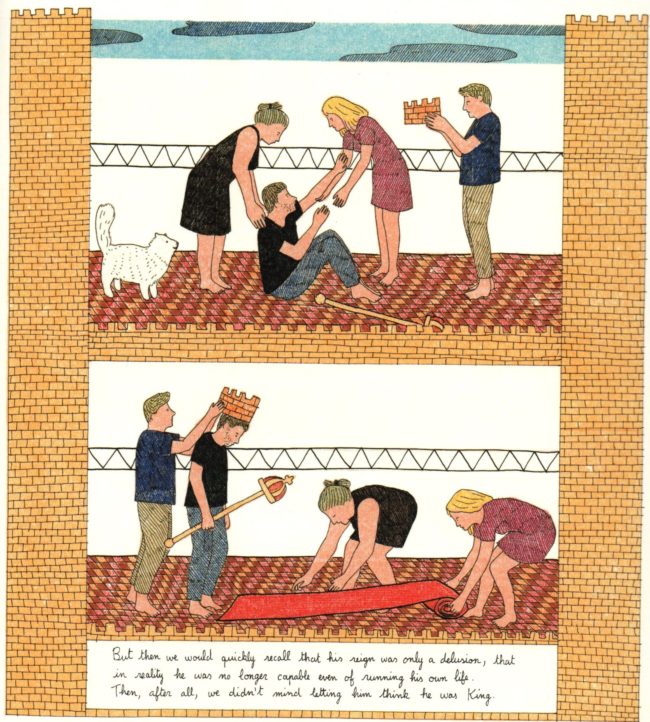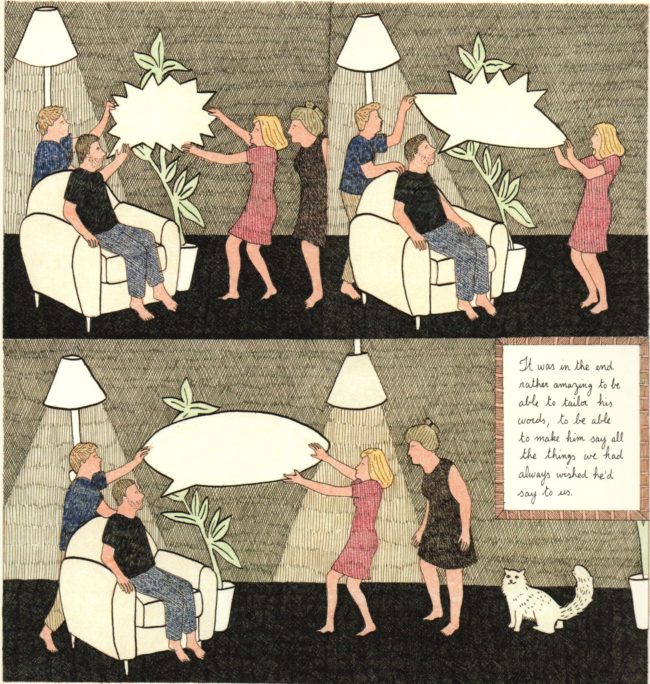In recent years a development has occurred which I like to describe as publishing comics for readers who despise comics. It arrived accompanying the rise of the Graphic Novel, which itself appeared just as a term referring to format alone, while actually desperately aiming to define the very substance of a work.
Point in case, New York Review Comics – an outlet assembling some of the finest works in comics history as Dominique Goblet or Nicole Claveloux, but also to be held accountable for securing anarchist-at-heart artist Hariton Pushwagner's Soft City with an introduction by comics' ambassador of high brow, Chris Ware, and, as if Pushwagner's skills on capturing this megalomaniac juggernaut of a city in pure understatement weren't enough to attract potential buyers, provided the book's cluttered cover design – has recently released The Tenderness of Stones by French draftswoman Marion Fayolle.
Its title does not only subsume the relationship between me and my editor at TCJ, but suggests a spiritual heaviness due to its burdening theme of suffering from the loss of a beloved person, here Fayolle's father, who's literally going to pieces due to terminal illness.
For the most part, The Tenderness of Stones is a comic refusing to be a comic, falling into the category of autobiographical books among contemporary releases like Emil Ferris' My Favorite Thing Is Monsters and Nora Krug's Belonging, both of which are equal efforts in avoiding depiction by favoring description.
 Though Fayolle's story isn't as wordy as the aforementioned examples, it mostly illustrates the events instead of providing the reader with additional levels achieved through visualization. Furthermore, it doesn't make much use of speech bubbles, except for one sequence where the maintaining of conversations between the now incommunicado father and his visitors is passed on to the daughter, thus illustrating the distortions as a result of misinterpretation from another person obliged to participate in the process. Herein the outlining of the bubbles picks up the conversation's subject visually and transmutes accordingly. That's quite a gimmick, but it only seems innovative because it appears in an otherwise old-established environment.
Though Fayolle's story isn't as wordy as the aforementioned examples, it mostly illustrates the events instead of providing the reader with additional levels achieved through visualization. Furthermore, it doesn't make much use of speech bubbles, except for one sequence where the maintaining of conversations between the now incommunicado father and his visitors is passed on to the daughter, thus illustrating the distortions as a result of misinterpretation from another person obliged to participate in the process. Herein the outlining of the bubbles picks up the conversation's subject visually and transmutes accordingly. That's quite a gimmick, but it only seems innovative because it appears in an otherwise old-established environment.
 The drawing style reminds me a lot of Olivier Schrauwen's Arsène Schrauwen, especially when Fayolle creates surrealist moments to convey the absurdity of the situations begotten by a daily routine subjected to the needs of a nursing case. But where Schrauwen spirals into undreamt heights – and also abysses – by making sheer oddness his driving shaft, Fayolle only manages a comfy pick-up train associated inevitably because of being clocked to a constant beat of normcore – reaching its most significant point in the father's depiction as a crowned tyrant ruling his offspring by imperial edicts born out of his maladies' requirements.
The drawing style reminds me a lot of Olivier Schrauwen's Arsène Schrauwen, especially when Fayolle creates surrealist moments to convey the absurdity of the situations begotten by a daily routine subjected to the needs of a nursing case. But where Schrauwen spirals into undreamt heights – and also abysses – by making sheer oddness his driving shaft, Fayolle only manages a comfy pick-up train associated inevitably because of being clocked to a constant beat of normcore – reaching its most significant point in the father's depiction as a crowned tyrant ruling his offspring by imperial edicts born out of his maladies' requirements.
 The two all-too-real sides of the coin of caring for family members who rely on help and the guilt complexes looming in those helping received a much more empathetic staging in The Replacer by Zac Thompson and Arjuna Susini earlier this year. Of course Aftershock tried to label that one Graphic Novella, but it's much more of a comic than The Tenderness of Stones. In the end, it's the execution that counts, not the selling point.
The two all-too-real sides of the coin of caring for family members who rely on help and the guilt complexes looming in those helping received a much more empathetic staging in The Replacer by Zac Thompson and Arjuna Susini earlier this year. Of course Aftershock tried to label that one Graphic Novella, but it's much more of a comic than The Tenderness of Stones. In the end, it's the execution that counts, not the selling point.







